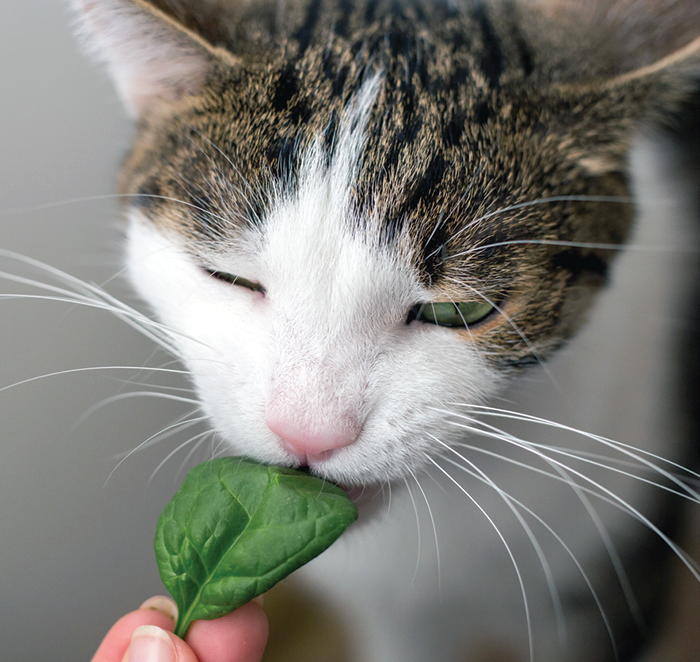Q. I have a question about urinary tract stones in cats. I had an issue with kidney stones, and my doctor told me to stay away from foods with high iron content, including spinach. Recently, a certain brand of cat food has developed flavors that contain spinach. I have had many cats over the years, with a couple having issues with bladder stones. Wouldn’t the same thing that my doctor told me to avoid be advisable for my cats to avoid, too?
A. Thanks for getting in touch, and I completely understand your concern regarding this issue. It’s important to realize, though, that while the way that cats digest and metabolize their food is, in some respects, similar to the way people digest theirs, it is quite different in others.
Perhaps a brief discussion of how urinary stones (called uroliths) form in cats would be helpful.
Uroliths are composed of different combinations of minerals and other compounds that are naturally found in urine, such as magnesium, phosphorus, and ammonium, which form struvite stones; and calcium and oxalate, which combine to form calcium oxalate crystals. If the concentrations of these minerals/compounds are high enough and the conditions are appropriate (largely determined by urinary pH), these minerals can combine to initially form microscopic crystals and, ultimately, larger uroliths.
The concentration of minerals and other urolith-forming compounds in the urine can be affected by dietary sources, by how much is excreted in the urine by the kidneys, and by how dilute the urine is. More dilute urine will generally result in lower urinary concentrations of a given mineral/compound if all other factors are kept constant.
Making sure that the urine is relatively dilute by assuring adequate water intake and that urine pH does not promote the formation of uroliths by modifying the diet are important aspects of preventing, and in some cases treating, feline uroliths.
Decreasing the amount of specific minerals/compounds in the diet results in a decreased excretion of them in the urine, thereby making it less likely that they will combine to form uroliths. A good example of this is the prevention of feline struvite uroliths by decreasing the amount of dietary magnesium and phosphorus. Another is reducing the likelihood of calcium oxalate uroliths by lowering the amount of protein in the diet. This results in a decreased production of oxalate that is formed during protein metabolism, thereby decreasing the amount of oxalate excreted in the urine.
Studies have shown that some people who eat enough foods with high calcium oxalate concentrations (like spinach) have an increased risk of calcium oxalate urolith formation, and this topic is the subject of ongoing research.
There are similar concerns about feeding spinach to cats that have a history of, or predisposition to, the formation of uroliths; however, there is no current evidence that feeding relatively small amounts of spinach to otherwise healthy cats is harmful.
Small amounts of spinach can provide some important nutrients for cats. Some experts have speculated that cooking spinach decreases its calcium oxalate content, so cooked spinach is generally considered to be safer than raw spinach for cats.
While I do not know which foods you are referring to or the amount of spinach in them, it is quite possible, if not probable, that the amount of spinach in them is not harmful and may very well be beneficial.
I hope that this is helpful, and best regards to you and your kitties from all of us here at the Feline Health Center. Please send us an update when you can.




